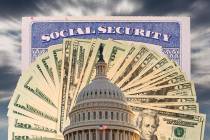And they will spend, spend, spend
Fifteen years ago, as The Washington Times points out, the federal budget deficit stood at $107 billion, government debt totaled $5 trillion and a balanced-budget constitutional amendment came within one senator's vote of passing Congress, "buoyed by the likes of then-Sen. Joseph R. Biden, who made an impassioned plea on the floor for its adoption."
Today, the deficit has topped $1 trillion for a third year in a row and the debt has tripled to $15 trillion. So on Friday, the House of Representatives once again considered a balanced-budget amendment.
"But Mr. Biden, now the vice president, has gone silent, and others who supported the amendment in the 1990s say they have soured on it," The Times reported Wednesday.
End result? The House failed to advance a new version of the amendment Friday. The aye vote was 261-165. Twenty-five Democrats joined Nevada GOP Reps. Joe Heck and Mark Amodei and the Republican majority, though Rep. Shelley Berkley, D-Nev., voted no. The total fell well short of the 290-vote, two-thirds majority needed to pass an amendment.
Four Republicans, including House Budget Committee Chairman Paul Ryan, also voted no, warning that removal of a supermajority requirement for future tax hikes as well as failure to set a cap on total federal spending could have turned the measure into a mechanism driving future tax hikes instead of spending cuts.
As far back as 1983, the late Milton Friedman warned about the risks of a balanced budget amendment without some accompanying limitation on tax hikes and overall spending: "I have never supported an amendment directed solely at a balanced budget. I have written repeatedly that while I would prefer that the budget be balanced, I would rather have government spend $500 billion and run a deficit of $100 billion than have it spend $800 billion with a balanced budget. It matters greatly how the budget is balanced, whether by cutting spending or by raising taxes."
Can Congress reduce spending below current income levels without such an amendment? Of course. Are they likely to?
The White House weighed in Tuesday with a scathing attack on the proposed amendment, saying that limiting spending now could trigger "a second Great Depression."
That doesn't seem to match up very well with assurances from other Democrats that they can and will get spending under control without the amendment.
Besides, the version of history that contends the economy was doing just fine till spending was restrained in 1937 doesn't match up very well with the analyses of people who were actually there.
After eight years of profilgate Keynesian spending in the 1930s, Treasury Secretary Henry Morgenthau Jr. gave a speech to the Academy of Political Science at New York's Hotel Astor, admitting, "We have tried spending money. We are spending more than we have ever spent before and it does not work. ... After eight years of this administration we have just as much unemployment as when we started. And an enormous debt to boot."
Government can't spend us to prosperity because government can only reallocate moneys it seizes as current taxes, or money that it promises to seize in the future to repay bond buyers.
Taxes remove expansion capital from the private sector. (See the current plight of the taxpayers of Greece and -- soon -- Italy.)
We've tried tax, print, borrow and spend -- on steroids -- for the past three years. Not only have the results not been as promised, but all these bailouts have had the perverse effect of keeping "walking dead" banks and other financial firms afloat, stalling any shakeout that could have allowed the economy to find a solid bottom.
Washington's answer? Friday's vote tells us to expect more of the same.

















